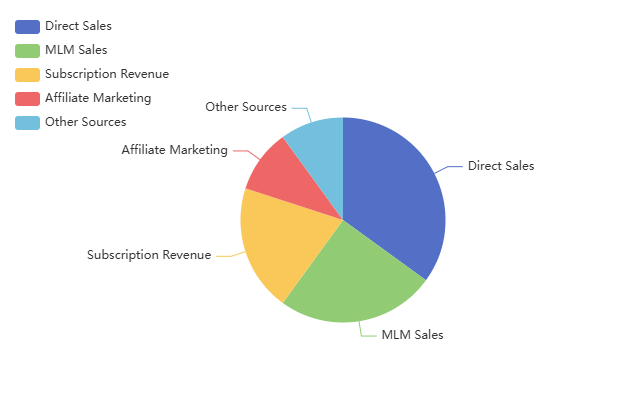Introduction
The multi-level marketing (MLM) industry is rapidly evolving. MLM businesses are leveraging technology to streamline operations and improve efficiency. However, one of the biggest challenges MLM companies face is inventory management. This includes ensuring that products are readily available, avoiding stockouts, and minimizing excess inventory.
Traditionally, MLM businesses relied on manual tracking and decentralized inventory systems, leading to inefficiencies that hinder scalability. With the rise of eCommerce solutions, MLM companies now have the opportunity to revolutionize their inventory management processes.
Advanced digital tools enable real-time tracking, automated restocking, and seamless integration with multiple sales channels, ensuring a smoother and more scalable operation. By adopting the best eCommerce inventory solutions, MLM businesses can enhance supply chain efficiency.
This article explores the challenges of traditional MLM inventory management, the role of eCommerce in optimizing operations, and the best technology-driven solutions to ensure sustainable growth in the future.
Challenges in Traditional MLM Inventory Management

Effective inventory management is a crucial aspect of running a successful MLM business. However, many MLM companies struggle with outdated or inefficient inventory systems, leading to operational bottlenecks and financial losses. Below are some of the key inventory challenges faced by MLM businesses.
- Overstocking and Understocking Issues
One of the biggest hurdles in MLM inventory management is maintaining the right balance between supply and demand. Overstocking leads to excessive storage costs, product expiration, and financial strain. On the other hand, understocking results in lost sales, frustrated distributors, and a damaged brand reputation due to delayed or canceled orders.
- Manual Tracking Inefficiencies
Many MLM companies still rely on spreadsheets, paper records, or outdated software to track inventory. These manual methods are not only time-consuming but also prone to human error. Inaccurate data can cause discrepancies in order fulfillment, leading to distributor dissatisfaction and revenue loss.
- Difficulty in Managing Multiple Sales Channels
Modern MLM businesses operate through various channels, including direct selling, social media marketing, eCommerce platforms, and affiliate networks. Without a centralized inventory management system, keeping track of stock across multiple platforms becomes challenging. This often results in overselling or discrepancies between available inventory and actual stock levels.
- Complexities of Commission-Based Order Fulfillment
Unlike traditional retail businesses, MLM companies must account for commissions and bonuses when fulfilling orders. Every sale may trigger multi-tiered commission payments, making it difficult to manage inventory while ensuring accurate compensation for distributors. Without an integrated inventory and commission system, businesses risk errors in tracking orders and payouts.
- Limited Visibility and Real-Time Insights
Traditional inventory management systems often lack real-time analytics, making it difficult for MLM businesses to make data-driven decisions. Without clear insights into stock levels, sales trends, and distributor demand, companies may struggle to optimize their supply chain, leading to inefficiencies and missed growth opportunities.
As MLM companies expand and scale, these inventory challenges become even more pronounced. To stay competitive in a digital-first marketplace, businesses need to transition to advanced eCommerce inventory management solutions that offer automation, integration, and real-time tracking. Having a multilingual platform is also an important feature in addressing communication challenges.
The Role of eCommerce in Modern MLM Inventory Management
As the MLM industry evolves, companies are increasingly turning to eCommerce solutions to streamline operations, improve efficiency, and scale their businesses. eCommerce platforms offer automation, real-time tracking, and seamless integration with multiple sales channels, making inventory management more effective. By leveraging the best eCommerce solutions, MLM companies can eliminate manual inefficiencies, optimize stock levels, and enhance the distributor and customer experience.
Automation of Inventory Tracking
One of the most significant advantages of eCommerce solutions is automated inventory tracking. Instead of relying on manual record-keeping, eCommerce platforms provide real-time stock updates, ensuring that MLM companies always have accurate data on product availability. This automation reduces the risk of overstocking or understocking and helps businesses maintain a steady supply of products for distributors and customers.

Integration with Sales and Commission Structures
Unlike traditional retail businesses, MLM companies must manage complex commission structures for distributors at multiple levels. eCommerce solutions integrate inventory management with sales tracking, ensuring that every transaction is recorded and linked to the correct distributor. This integration minimizes errors and ensures timely and accurate payouts.

Seamless Order Fulfillment and Dropshipping Solutions
Modern eCommerce platforms offer streamlined order fulfillment capabilities, including drop shipping options that allow MLM companies to reduce warehousing costs. This not only reduces overhead expenses but also improves order processing speed and scalability. These results also help accommodate changing consumer demands.

Centralized Dashboards for Real-Time Analytics
eCommerce solutions provide centralized dashboards that offer valuable insights into inventory levels, sales trends, and distributor performance. With real-time analytics, MLM companies can make data-driven decisions, such as adjusting stock levels based on demand forecasting, optimizing pricing strategies, and identifying best-selling products. This visibility allows businesses to stay agile and responsive to market changes.

Enhanced Multi-Channel Selling Capabilities
MLM businesses operate through various channels, including direct sales, online marketplaces, and social media. eCommerce platforms enable seamless integration with multiple sales channels, ensuring that inventory is synchronized across different platforms. This prevents overselling, reduces discrepancies, and enhances the customer experience by ensuring product availability.

Improved Customer and Distributor Experience
By leveraging eCommerce solutions, MLM companies can enhance the overall experience for both customers and distributors. Features like automated order confirmations, real-time shipment tracking, and self-service portals allow efficient sales management. Customers also benefit from a smoother purchasing process, faster deliveries, and better product availability.
Key eCommerce Features to Optimize MLM Inventory

To successfully scale an MLM business, adopting the right eCommerce features is essential. The best eCommerce solutions streamline inventory management, automate processes, and integrate seamlessly with sales and commission systems. Below are the key eCommerce features that can help MLM businesses optimize inventory and enhance operational efficiency.
-
Cloud-Based Inventory Management
A cloud-based inventory system allows MLM businesses to track stock levels in real time from anywhere. This ensures that distributors, suppliers, and business owners have instant access to accurate inventory data, reducing the chances of overselling or running out of stock. Additionally, cloud-based solutions offer better security, automatic updates, and scalability as the business grows.
-
AI-Powered Demand Forecasting
Artificial intelligence (AI) and machine learning can analyze historical sales data, seasonal trends, and distributor demand patterns to predict future inventory needs. By leveraging AI-powered demand forecasting, MLM businesses can optimize stock levels, prevent excess inventory, and minimize stockouts, leading to better cash flow management.
-
Omnichannel Integration
Modern MLM businesses sell through multiple channels, including eCommerce websites, social media, mobile apps, and direct sales. The best eCommerce solutions with omnichannel integration synchronize inventory across all sales channels, preventing discrepancies and ensuring accurate stock availability. This improves order accuracy and provides a seamless shopping experience for customers and distributors.
-
Automated Restocking & Supplier Management
Automated restocking features help MLM businesses maintain optimal inventory levels by triggering reorder alerts when stock runs low. Some advanced systems can even place automatic purchase orders with suppliers based on predefined thresholds. This eliminates manual tracking, reduces the risk of stock shortages, and ensures a steady supply of products.
-
Customizable MLM Order Processing
Unlike traditional eCommerce businesses, MLM companies have unique order processing needs, including tiered pricing, distributor discounts, and multi-level commission tracking. Customizable order processing features allow businesses to set up rules for distributor pricing, commission structures, and bulk order management. This ensures seamless order fulfillment while maintaining accuracy in payouts and inventory tracking.
-
Real-Time Analytics and Reporting
An effective eCommerce solution provides real-time analytics that offers deep insights into inventory performance. Businesses can track product sales, identify fast-moving and slow-moving items, and adjust stock levels accordingly. Reporting tools also help in monitoring distributor activity, sales trends, and order fulfillment efficiency, allowing for data-driven decision-making.
-
Integration with Payment Gateways and E-Wallets
The best eCommerce solutions should integrate with multiple payment gateways to accommodate various payment methods, including credit cards, PayPal, and cryptocurrency. Additionally, built-in e-wallet systems allow distributors to manage earnings, transfer commissions, and make purchases directly from their MLM accounts. This simplifies financial transactions and helps businesses stand out in a saturated market.
Conclusion
As the MLM industry grows, efficient inventory management is essential for scalability and long-term success. Traditional inventory management methods often lead to inefficiencies such as stock imbalances, order fulfillment delays, and manual tracking errors. However, by adopting advanced eCommerce solutions, MLM businesses can create a more streamlined, automated, and scalable inventory system.
Cloud-based inventory management, AI-powered demand forecasting, omnichannel integration, and real-time analytics provide MLM companies with the tools needed to optimize stock levels, enhance order fulfillment, and improve distributor experiences. Features like automated restocking, customizable order processing, and seamless payment integration further contribute to operational efficiency and business growth.
With the continued advancement of eCommerce technology, MLM businesses that embrace digital transformation will gain a competitive edge. By investing in scalable eCommerce solutions, MLM companies can not only improve inventory management but also drive greater distributor engagement, customer satisfaction, and overall profitability.
About The Author
Benjamin is a dedicated Researcher and Content Strategist with a passion for crafting compelling narratives and driving impactful results. With expertise in market analysis, audience engagement, and content optimization, he excel at transforming complex ideas into clear, actionable strategies. Known for their creativity and analytical mindset, Benjamin helps brands connect meaningfully with their audiences and achieve their goals.
MLM Business




